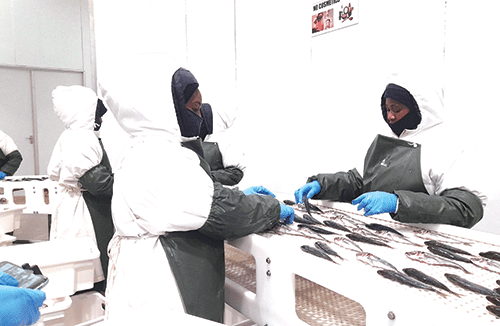The Namibian fishing industry maintained its status as the third-largest contributor to the nation’s Gross Domestic Product in 2023, setting an example for responsible resources management globally.
However, amidst its notable successes, the industry grappled with formidable challenges which demanded strategic resilience. Illegal, unreported and unregulated (IUU) fishing persisted as a perennial issue, challenging the industry’s commitment to sustainable practices. Simultaneously, the relentless rise in fuel costs posed a significant threat to the sector’s profitability, necessitating innovative solutions to navigate economic headwinds.
Compounding these challenges was the spectre of job losses, adding a human dimension to the economic complexities.
Against this backdrop, the fisheries ministry’s scientists sounded alarms regarding declining biomass in the crucial horse mackerel stock, the cornerstone of the industry’s vitality.
Here is a detailed recap of the events in the fishing industry throughout 2023:
January
The year began on a negative note as 15 fishermen were rescued on 15 January after the fishing vessel, Charlene, owned and operated by Seeheim Fishing (Pty) Ltd, caught fire and sank in the Namibian Exclusive Economic Zone (EEZ). Simultaneously, the finance ministry announced that the government generated N$110 million from the sale of 15 000 metric tonnes of hake.
February
Member of Parliament Mike Kavekotora raised concerns over seal harvesting in the country, highlighting the challenges faced by the seals processing factory in Henties Bay and the National Youth Council (NYC) in penetrating larger markets due to sensitivities around seal culling. Namibia is estimated to have about 1.5 million seals, consuming approximately 2 million metric tonnes of fish annually.
March
A state-of-the-art fishing factory, Merlus Cormorant Fishing, opened its doors at Walvis Bay, investing a total of N$154 million in construction.
April
Erongo Marine Enterprises paid out N$13 million in dividends to 150 permanent employees, with each employee receiving N$69 000 before tax deductions.
May
The fisheries and labour ministries were actively consulting with the fishing industry to finalise the re-employment of over 1 200 fishermen. This process proved challenging for the government following the Fishrot scandal.
June
The Namibia Fish Consumption Promotion Trust (NFCPT) generously donated 10 computers valued at over N$211 000 to the National Youth Council (NYC), the Oranjemund Youth Forum and the School Infrastructure Improvement Initiative.
July
NamRa commissioner Sam Shivute revealed that the fishing industry contributes less than 2% in taxes, urging special attention to the sector. However, the Confederation of Namibian Fishing Associations’ chairperson, Matti Amukwa, contested this figure, stating that the hake sector alone pays nearly N$1 billion in direct taxes. In July, Etosha Fishing announced its closure, but the government intervened, allocating 5000 metric tonnes of horse mackerel, and saving over 400 jobs.
August
The Public Standing Committee on Natural Resources explored the possibility of introducing seal meat to Namibians, considering canning it for both international and local consumption, as a potential market to control and sustainably harvest the country’s underutilised seal quota.
September
The fishing industry objected to the government’s increasing involvement in the sector, claiming a shift from a regulatory body to an active participant. They argued that the government, as the largest quota holder resulting from auctions, operated without adhering to the same rules imposed on private entities, such as job-creation and value-addition. In contrast, September saw a tidal wave of growth, with fish exports reaching an impressive N$4.1 billion, showcasing the industry’s resilience and economic potential.
November
The government of Indonesia extended a development grant of N$5.3 million through its Indonesia Agency for International Development to the Namibian Maritime and Fisheries Institute. Additionally, the Namibian Competition Commission announced investigations into fishing vessel owners and operators for alleged fixing of quota usage fees paid to fishing rights holders.
December
The start of the new fishing year marked the conclusion of a challenging yet eventful 2023 for the Namibian fishing industry.



